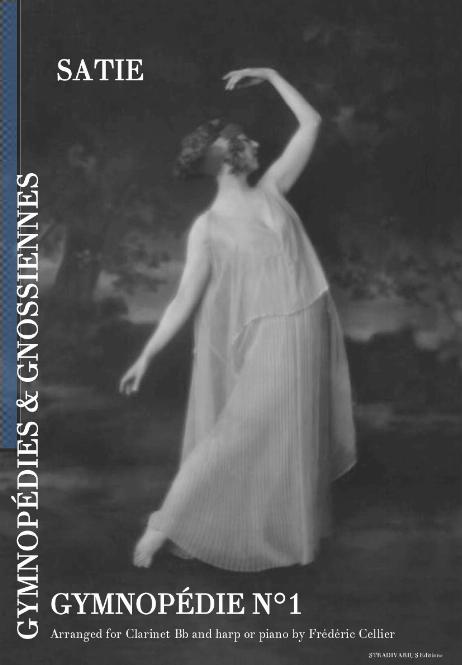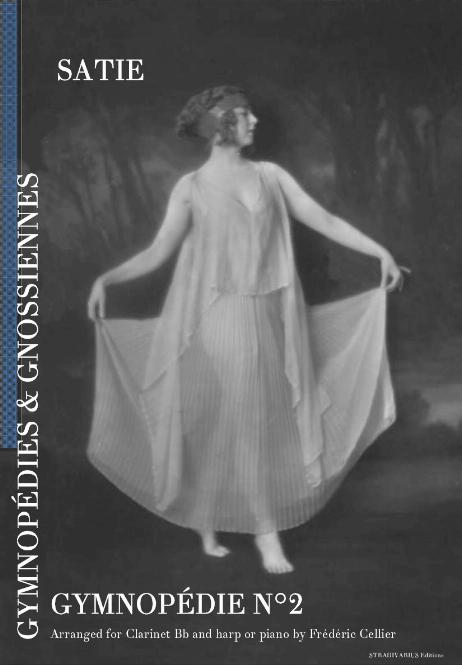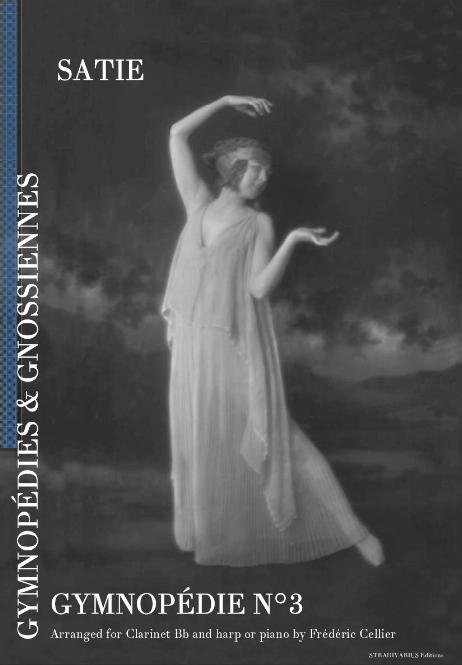- Voice
- Keyboard
- String
- Woodwind
- Brass
- Library

 $ 11.98
$ 11.98
3 movements
$ 14.97
- 20 %
$ 11.98

SCORE Clarinet Bb and harp or piano
PDF - 5 pages
PART Clarinet Bb
PDF - 2 pages

SCORE Clarinet Bb and harp or piano
PDF - 4 pages
PART Clarinet Bb
PDF - 2 pages

SCORE Clarinet Bb and harp or piano
PDF - 4 pages
PART Clarinet Bb
PDF - 2 pages
TOTAL : $ 14.97
- 20 %
TOTAL : $ 11.98
The Gymnopédies have rightly been described as very slow waltzes whose suspension in time verges on its dissolution. It should be noted that Satie, after having been a pianist at the cabaret Le chat noir, was a "hired tapper" at L'auberge du clou where he met Debussy, and although he did not "write" his own waltzes Je te veux, Poudre d'or and Tendrement until 1900, he knew the haunting vertigo of the three-beat rhythm like the back of his hand, to the point of nausea. That the Gymnopédies may have been born under the slowed-down fingers of the exhausted pianist on a particularly long and boring evening has always seemed to me the most likely hypothesis for their nostalgic slowness.
The only thing left is the title, so deliberately precious and rare that it could have passed for a neologism. Satie did not invent it, however, borrowing it from his erudite reading of Greek authors and other archaeological works that attest to its existence in ancient Greece.
"The gymnopedies were an annual festival celebrated by the Spartans in the month of Hecatombaion (2nd half of July and 1st August) in honour of the warriors who died at Thyrea. They consisted of dances performed by two troupes of naked men and children".
A spiritual evocation, then, a journey in time beyond even his beloved Middle Ages, but also a disorientation in space towards the birthplace of humanity, this ancient Greece which, in his mind sometimes pagan, sometimes Christian, joins Chaldea in the East of his dreams, the artistic materialisation of the original paradise where "all is order and beauty, luxury, calm and voluptuousness".
Frédéric Cellier - 2002
Along his university studies (DEA in musicology, University of Paris IV-Sorbonne), Frédéric Cellier was awarded three first prizes and a development prize at the CNR of Nice and won first prize at the International Competition of Musical Execution - soloist category – of Stresa (Italy).
He is the laureate of the Fondation de France and the Yehudi Menuhin Foundation and accredited teacher at the CNR of Nice, the CNR of Marseille, and at the CRR Olivier Messiaen of Avignon (France).
Frédéric Cellier is the interpreter of Francis Poulenc’s Sonata for clarinet Bb and piano with Jean-Michel Damase, Jean Françaix or Gabriel Tacchino, but also performs his own version for clarinet, piano and string orchestra of George Gershwin’s Rhapsody in blue for Wynton Marsalis or under the baton of Adrian Gershwin, grandson of the composer.
Founder and artistic director of STRADIVARIUS Editions, he is the author of pieces of light music and a considerable number of arrangements in all styles and for all instruments acclaimed by numerous personalities in the music world:
"Frédéric Cellier has produced a number of adaptations of Georges Auric's works with such talent and precision that I consider them a natural addition to his chamber music catalogue."
Michèle AURIC - Georges Auric's widow
"To Frédéric Cellier, excellent musician and tireless arranger."
Jean FRANÇAIX - Composer and pianist
"Arranging a musical work is always a delicate and risky exercise, because it requires both modifying it so that it can be played by the desired instruments and preserving its very essence. But that is exactly what Frédéric Cellier has done, preserving the nuances, subtleties and soul of the original works while breathing new life into them.
His arrangements give all the musicians the chance to perform these compositions specially revisited for their instrument, and make music lovers rediscover them in a new light."
Adrian GERSHWIN - George Gershwin’s grandson
"Congratulations for your beautiful new orchestration and rendition of Gershwin’s Rhapsody in blue."
Wynton MARSALIS - Trumpet player, composer, bandleader, general and artistic director of Jazz at Lincoln Center, New York
"It is outstanding that Frédéric Cellier has managed to transpose Saxophone Marmalade from the saxophone to the clarinet. I thank him for it and wish its great and deserved success. "
Manuel ROSENTHAL - Conductor, composer and Maurice Ravel’s pupil
"I am very happy to tell you how much I appreciated your transcription of the Capriccio, based on Francis Poulenc's Le Bal Masqué. It perfectly reflects the spirit and verve of the score for two pianos that I had the opportunity to play and record with Jacques Février, and it was a great pleasure for me to premiere it in Montpellier."
Gabriel TACCHINO - Pianist, Francis Poulenc’s specialist
"I must tell you that I really like your transcriptions and that I think the tone of the instruments you have chosen suits perfectly our beloved composer."
Ornella VOLTA - Musicologist, president of the Erik Satie’s Foundation
Added to your basket

Removed from your basket

Added to your favorites

Removed from your favorites

You must be registered to use this function

You reached the download limit for free products (5 per day)
